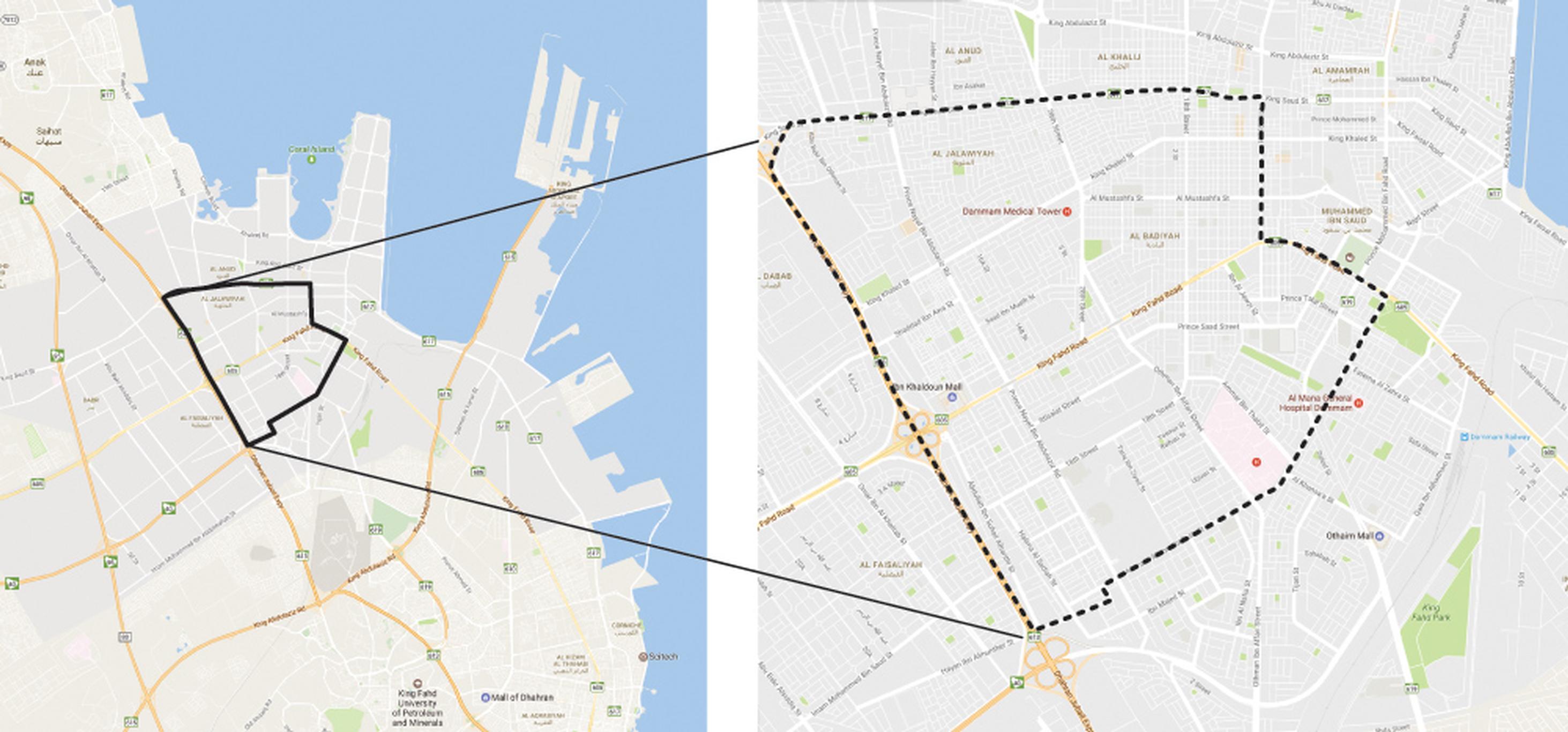

Saudi Arabia’s traffic safety issues have recently reached alarming levels when compared to the rest of the world. While considerable resources are being spent by the public sector to reverse the emerging traffic safety crisis nationwide in terms of expansion of infrastructure, much research is still needed to consider the different avenues of deployment of ITS to help deter the steeply inclining traffic safety issues curve. The Saudi Aramco Chair for Traffic Safety research, with the help of stakeholders, is considering unexplored avenues to promote ready solutions based on scientific research-based practice in order to mitigate traffic safety. The resulting pilot study considers the possibility of providing drivers with better travel time information, in cohort with improving the traffic signal controls in response to flow variations (or vice versa), in a single modelling framework for an area of Dammam Central Business District.
The investigations were conducted by quantifying the benefits in terms of system-wide travel time improvements, system-wide delay reductions, and ultimately quantifying the value of time benefits for the economy of Dammam. The analysis showed that when drivers were provided with better route choice and travel time information, and the signal controls in the selected traffic systems were improved to flow responsive traffic controls, the entire traffic system could benefit from the system-wide delay reductions of up to 35% and system-wide travel time improvement benefits of up to 20%. Further, the time-cost evaluation showed that if this improvement in controls and smart travel time information system is implemented in real life, it could save the Dammam economy up to 35 million Saudi Riyals daily (more than £7 million) just by optimising the controls; however, if the controllers are improved to flow responsive type, these benefits could exceed 90 million Riyals daily (more than £18 million) for the selected study area.
This study is one attempt to improve the overall traffic system, and hence the improve the traffic safety in the region. Keeping in view the benefits shown by the modelling and simulation of the concept, the study team recommends a test-bed case real-life implementation of smart city ITS improvements in the same study area as a test case.
The analysis showed that when drivers were provided with better route choice and travel time information, and the signal controls in the selected traffic systems were improved to flow responsive traffic controls, the entire traffic system could benefit from the system-wide delay reductions of up to 35% and system-wide travel time improvement
The following could be concluded from the modelling results:
Both Dr Muhammad Farhan and Dr Abdul Hameed Al-Mojil, Department of Traffic and Transportation Engineering, College of Engineering, University of Dammam, Dammam, Saudi Arabia, worked on this study.
There are currently 27 traffic fatalities a day in Saudi Arabia. About 70% of the victims are under the age of 30 – unfortunately, this tragic number keeps growing. Thus, it is high time that road safety in the region becomes a top priority in the academic field as well as in the public and private sector. The University of Dammam is the only University in Saudi Arabia that offers a Bachelor’s degree with a focus on traffic engineering. This course was introduced three years ago. At present more than 100 students are enrolled in the degree programme and the popularity of the field of study is growing fast. In November 2016, the PTV Traffic Safety Engineering and ITS Innovation Lab was opened at the Saudi-Aramco University of Dammam. At this state-of-the-art lab, students will be taught how to implement PTV software in the best possible manner. Muhammad Farhan from the Saudi Aramco Chair for Traffic Safety Research has been involved in this project from the beginning.

TransportXtra is part of Landor LINKS
© 2025 TransportXtra | Landor LINKS Ltd | All Rights Reserved
Subscriptions, Magazines & Online Access Enquires
[Frequently Asked Questions]
Email: subs.ltt@landor.co.uk | Tel: +44 (0) 20 7091 7959
Shop & Accounts Enquires
Email: accounts@landor.co.uk | Tel: +44 (0) 20 7091 7855
Advertising Sales & Recruitment Enquires
Email: daniel@landor.co.uk | Tel: +44 (0) 20 7091 7861
Events & Conference Enquires
Email: conferences@landor.co.uk | Tel: +44 (0) 20 7091 7865
Press Releases & Editorial Enquires
Email: info@transportxtra.com | Tel: +44 (0) 20 7091 7875
Privacy Policy | Terms and Conditions | Advertise
Web design london by Brainiac Media 2020